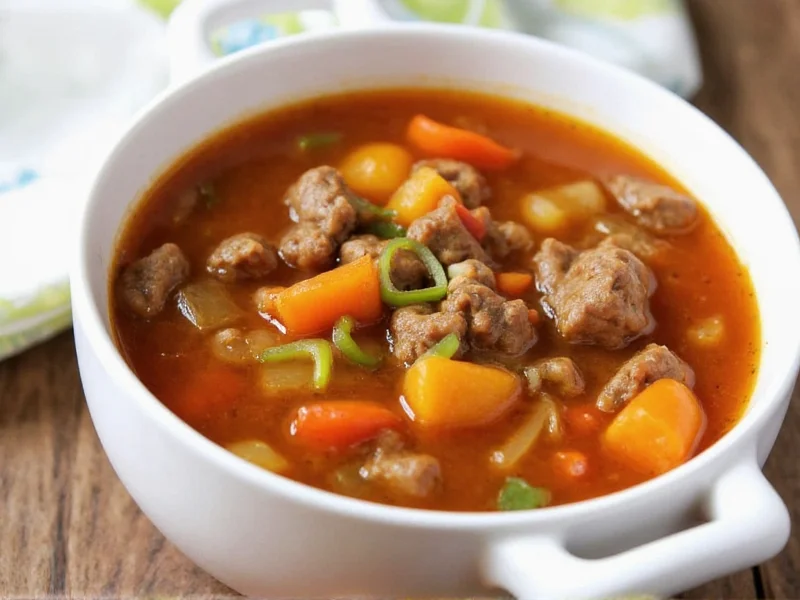The best crock pot vegetable beef soup combines 1.5 lbs stew beef, 4 cups beef broth, 1 can diced tomatoes, 1 can tomato juice, 4 cups mixed vegetables (carrots, celery, potatoes, green beans), 1 onion, 3 garlic cloves, and classic seasonings. Cook on low for 7-8 hours or high for 4-5 hours for tender meat and perfectly infused flavors without overcooked vegetables.
There's nothing quite as comforting as a steaming bowl of vegetable beef soup made effortlessly in your slow cooker. This classic American comfort food transforms humble ingredients into a hearty, nutritious meal with minimal hands-on time. The magic of slow cooking allows tough cuts of beef to become fork-tender while vegetables maintain their texture and nutrients.
Why Crock Pot Vegetable Beef Soup Works So Well
Slow cooking excels with this recipe for several science-backed reasons. The low, consistent temperature (typically 170-280°F) breaks down collagen in tougher beef cuts into gelatin, creating that signature rich mouthfeel. Unlike stovetop methods where vegetables often turn mushy, the gentle heat in a crock pot preserves vegetable integrity while allowing flavors to meld beautifully over time.
Essential Ingredients for Perfect Results
Quality ingredients make the difference between ordinary and exceptional soup. Here's what you'll need for an eight-serving batch:
| Ingredient | Amount | Preparation Notes |
|---|---|---|
| Stew beef (chuck or round) | 1.5 lbs | Cut into 1-inch cubes, patted dry |
| Beef broth (low sodium) | 4 cups | Homemade preferred, but quality store-bought works |
| Diced tomatoes | 1 (14.5 oz) can | With juices, no salt added preferred |
| Tomato juice | 1 (8 oz) can | Provides depth without overpowering acidity |
| Mixed vegetables | 4 cups | Carrots, celery, potatoes, green beans (fresh or frozen) |
| Yellow onion | 1 large | Diced medium |
| Garlic cloves | 3 | Minced |
| Olive oil | 1 tbsp | For searing beef |
| Dried thyme | 1 tsp | Fresh if available |
| Bay leaves | 2 | Remove before serving |
| Salt and black pepper | To taste | Add after cooking |
Step-by-Step Preparation Guide
Follow these precise steps for restaurant-quality results every time:
- Prepare ingredients: Dice all vegetables uniformly (about 1/2-inch pieces) to ensure even cooking. Pat beef cubes completely dry with paper towels.
- Sear the beef: Heat olive oil in a skillet over medium-high heat. Working in batches to avoid crowding, sear beef on all sides until browned (about 2-3 minutes per side). This crucial step develops flavor through the Maillard reaction.
- Layer in crock pot: Place half the vegetables in the slow cooker bottom, then add seared beef, remaining vegetables, garlic, and seasonings. Pour broth and tomato products evenly over everything.
- Cook properly: Cover and cook on LOW for 7-8 hours or HIGH for 4-5 hours. Avoid opening the lid frequently, as this adds 20-30 minutes to cooking time each time.
- Final seasoning: Remove bay leaves. Taste and adjust salt and pepper. For thicker broth, mix 2 tbsp cornstarch with 3 tbsp cold water and stir in during the last 30 minutes of cooking.
Pro Tips for Exceptional Results
Achieve consistently perfect crock pot vegetable beef soup with these professional techniques:
- Beef selection matters: Choose well-marbled chuck roast instead of pre-cut stew meat, which often contains gristly pieces. Cut your own 1-inch cubes for uniform cooking.
- Acidity balance: If your soup tastes flat, add 1 tsp apple cider vinegar or lemon juice just before serving to brighten flavors.
- Vegetable timing: For crisper vegetables, add delicate items like green beans during the last 2 hours of cooking.
- Flavor concentration: For deeper flavor, reduce 1 cup of broth by half on the stovetop before adding to the slow cooker.
- Fat management: Chill finished soup overnight; solidified fat will be easy to remove from the surface for a cleaner-tasting broth.
Common Variations and Substitutions
Adapt this versatile recipe to suit dietary needs or available ingredients:
- Gluten-free: This recipe is naturally gluten-free. Ensure your broth contains no wheat-based ingredients.
- Lower sodium: Use no-salt-added tomatoes and broth, and increase herbs like parsley, thyme, and rosemary for flavor without salt.
- Tomato-free version: Substitute tomato juice with additional beef broth and 2 tbsp red wine vinegar for acidity.
- Extra protein: Add 1 cup rinsed cannellini beans during the last hour of cooking.
- Spicy kick: Include 1 diced jalapeño or 1/4 tsp red pepper flakes with the other vegetables.
Serving and Storage Recommendations
Maximize enjoyment and shelf life with these guidelines:
- Serving temperature: Soup tastes best served piping hot (165°F or higher). Ladle into pre-warmed bowls to maintain temperature.
- Perfect pairings: Serve with crusty bread, a simple green salad, or cornbread for a complete meal.
- Refrigeration: Store in airtight containers for up to 4 days. Flavors often improve after 24 hours as ingredients meld.
- Freezing: Freeze in portion-sized containers for up to 3 months. Thaw overnight in refrigerator before reheating.
- Reheating: Warm gently on stove over medium-low heat, stirring occasionally. Avoid boiling to prevent vegetable breakdown.
Troubleshooting Common Issues
Solve these frequent crock pot vegetable beef soup problems:
- Meat is tough: Undercooked beef needs more time. Return to cooker for additional 1-2 hours on LOW. Ensure you're using appropriate cuts like chuck.
- Vegetables are mushy: Add root vegetables first, then softer vegetables during the last 2-3 hours. Cut vegetables larger than usual.
- Soup is too thin: Mix 2 tbsp cornstarch with 3 tbsp cold water and stir in during the last 30 minutes of cooking.
- Soup is too salty: Add 1-2 peeled, quartered potatoes to absorb excess salt, removing after 30 minutes.
- Lack of depth: Brown meat thoroughly, use quality broth, and consider adding 1 tsp Worcestershire sauce near the end.











 浙公网安备
33010002000092号
浙公网安备
33010002000092号 浙B2-20120091-4
浙B2-20120091-4